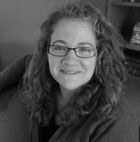Part 1 of this post can be found here.
One of the things that can be hardest about watching our children grow into adolescence and young adulthood is dealing with our own hopes and fears about their sexuality. As a counselor at Hillel UW, I often have the opportunity to talk with young people about their sexual lives. I can tell you this: young adults have a wide range of experiences as they begin to explore their sexuality, and it is complicated. As parents, there are foundational skills that we can begin to build, in a developmentally appropriate way, very early in our children’s lives.
Demonstrate healthy boundaries – even if it is hard. We hope that our children will have the skill and confidence to maintain their boundaries sexually, to assert what they want and to say no to the things that they don’t want. In reality, though, it can be difficult to say no to people that we like and care about, to feel like we are letting someone down or to acknowledge that we don’t want the same things. We may feel that we need to do whatever it takes to maintain peace in our relationships, even if this means doing things that we deeply do not want to do. Teach your children that it is ok to say no to people you love and care about, and that it is a normal part of relationships that we disappoint and disagree with each other sometimes. Most importantly, model this behavior. Allow them to see you set boundaries with people you love, and explain what you are doing. “Aunt Susan wanted us to go on a bike ride, but we didn’t have a helmet for you. I didn’t feel comfortable with that, so I said no. I think she was disappointed, but I had to do what felt safe to me.” “Did you notice that I took a step back when we were talking with our neighbor? I felt uncomfortable with how close he was standing. I could see that he was very sad about his dog and wanted to stand very close together, but I had to listen to my own body.”
Share your values around sexuality – but also let them know you will support and love them if they don’t adhere to these values. For some parents, it is a core value that sexuality should be reserved for marriage. Other parents feel that sexuality can have a place in any committed, monogamous relationship – and may even hope that their children will have serious relationships and some opportunity to explore their sexuality before they settle down. Still others feel that sex is appropriate and acceptable in a range of relationships, including casual hook-ups, as long as certain standards of mutual respect and safety are met. As your child learns about sexuality, be transparent about the values you hope to teach – but also let them know that you will love and respect them if they choose differently. This lets them know that they can turn to you, even if their choices are not what you had hoped.
Get support for yourself. Sexuality can be a loaded topic for many of us. Watching our children grow into their own sexuality can be challenging, and talking with them about sex is not always easy. Robie Harris has a wonderful series of kids’ books that can provide a helpful springboard for conversations with children. Amy Lang, a local sex educator, has books for both kids and parents that may be useful. Make sure you get the support you need by talking with friends and other parents.
Researchers estimate that 17% of women 3% of men are sexually assaulted during their lifetime. This means that many of us who are parenting have actually experienced some form of sexual violence or violation ourselves. It is very normal for these memories, and the range of emotions that go with them, to come to the surface when our children reach the age or developmental stage we were at when we were harmed. This can be a time of tremendous healing for parents who are survivors of sexual violence, but it is important to get support. This helps us to sort out our own history from what our children are actually experiencing and allows us to be more fully present.
 By Danica Bornstein
By Danica Bornstein
Danica Bornstein, LICSW, is the Clinical Counselor at Hillel UW. The Hillel Counseling Program is a joint project of Hillel UW and Jewish Family Service and provides counseling for Jewish young adults aged 18-32.
Feature image by imcute_ladybug2004.



